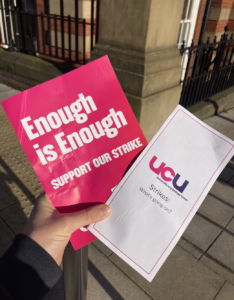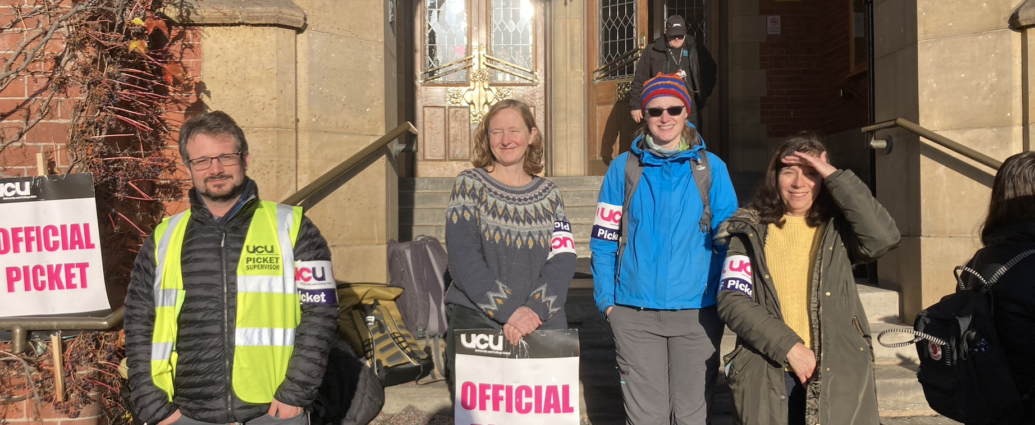Cerys Jones
Up to 2.5 million students were impacted when 70,000 university staff went on strike last week. Members of the University and College Union walked out on the 24th and 25th November, with further strike action due on Wednesday 30th November. Staff are in an ongoing dispute over pay, pensions, and conditions, with action taken at 150 UK universities—including the University of Sheffield.
Reasons for the strike
On the picket line outside the University’s Jessop West building, lecturer David McCallan explained some of his reasons for going on strike: “They [the University] know the price of everything and the value of nothing.”
“We’ve had a 25 per cent real terms pay cut in the last 10 years and with the cost of living rising, we’re not immune to it. As a result, we think we should get a fair pay rise, like anyone else in this situation.”
We’d rather be teaching today. But we are fighting for a fairer and healthier education system. ✊🏼
Staff working conditions = Student learning conditions
Sheffield is more beautiful today. Even the sun ☀️ came out.
#ucuRISING @sheffielducu @ucu pic.twitter.com/5lnf3JCaIK
— Pol Masdeu (@pmasca) November 25, 2022
The BBC reported that the average lecturer’s salary sits just under £40,000, meaning many students are confused at the anger over pay.
“Our working conditions are your learning conditions”
Ian Sudbry, the picket supervisor outside Firth Court, said: “Although a lecturer’s salary might not look that bad, actually the majority of people employed by universities aren’t lecturers. For every lecturer there are many teaching fellows, teaching assistants, research associates, and technicians who are all paid much less.”
He also described how staff’s pensions have fallen in value: “My pension was supposed to be worth £21,000 a year when I retired. As of the changes this year, it’s now worth £13,000 a year.”

‘Casualisation’ was also cited as a problem on multiple pickets. This refers to an increase in the number of staff employed on insecure, temporary, or short-term contracts. The UCU say that 71 per cent of university staff say insecure contacts have harmed their mental health. Their report also highlighted the potential impact on students, with 67 per cent of teaching staff saying that they did not have enough paid time to prepare adequately for their classes.
“Our working conditions are your learning conditions,” said David McCallan, while Ian Sudbry said: “The service that students are getting at the minute is not as good as it should be. They shouldn’t be getting taught by people who are on temporary contracts, who don’t know where their next pay check is coming from.”
What do students think?
“I pay £9,000 a year. I want to see more of that going into my teachers.”
Some students have expressed frustration at the disruption, especially considering the high cost of their tuition fees.
However, the National Union of Students has given its support to the strikers and many students are also sympathetic. Winko Kyaw Oo, who studies Molecular Biology, was giving out snacks on pickets today and said: “I pay £9,000 a year. I want to see more of that going into my teachers.”
“I talked to the staff. They don’t want to strike—but they have to. They want to be teaching us, but on better terms. They want more time to mark our work. They want more time to prep for lectures. Quality over quantity.”
I NEED EVERY SINGLE ONE OF MY FOLLOWERS TO RT THIS
70,000 UCU members strike tomorrow.
Every university in the UK.
Tomorrow we make history. #ucuRISING
— Jo Grady (@DrJoGrady) November 23, 2022
A representative from the Sheffield branch of the UCU said: “Students can show support by joining our Barkers’ Pool rally at midday on the 30th, talking to striking staff about their concerns and conditions, and writing to the Vice Chancellor to urge him to exert pressure on UUK and UCEA to meaningfully negotiate.”
What happens next?
Disruption will continue when staff return to the picket line on Wednesday 30th November—but this will be far from the end of the dispute.
“The Union has already announced the threat of hard-hitting action for the New Year”
Ian Sudbury said the pre-Christmas strikes are “a show of strength” and that action may well escalate. He went on to say: “The ultimate nuclear weapon which everyone really doesn’t want to think about is the boycott of final assessments” – meaning that “exams wouldn’t be marked.”
Most staff emphasised that they weren’t happy about the disruption to students, but felt they had little choice. Caroline Bland, a lecturer in the Department of Languages and Culture, said staff didn’t want to go as far as a boycott of assessments: “We care very deeply about our students…We really don’t want to push it that far.”
Others agreed, but also pointed out that they felt forced to take action. Ian Sudbry said: “We get to the point where there’s nowhere else we can escalate to.”
When asked for comment, a UCU Sheffield representative said that details of “hard-hitting action” for the New Year would soon be revealed without meaningful negotiations.
They said they hoped a boycott of final exams could be avoided by resolving the dispute. “We have seen, however, from last academic year’s marking boycott that this is an effective strategy for bringing the employer to the negotiation table, and this brought a swift end to our action last year with local concessions from the employer. We urge university employers to engage with our demands so that we can avoid any further action next year.”
Featured image courtesy of Cerys Jones. No changes have been made to this image.

